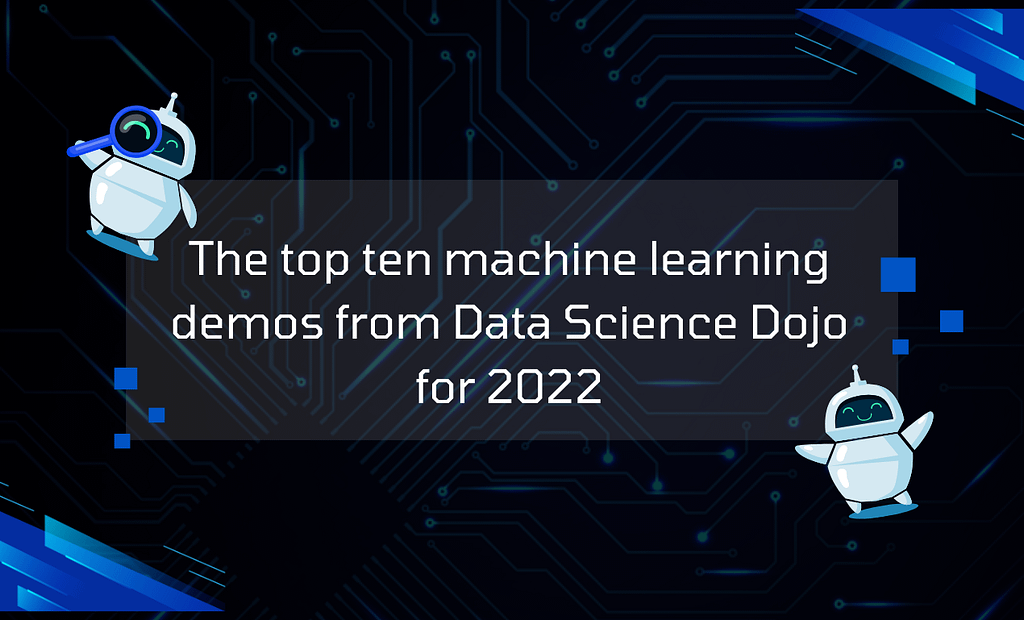The Top Ten Machine Learning Demos from Data Science Dojo for 2022

Data Science Dojo has consistently been at the forefront of data science education, offering hands-on training and practical insights into the world of machine learning (ML). In 2022, they showcased several impressive machine learning demos that highlighted the capabilities and applications of ML algorithms in various domains. Here, we explore the top ten machine learning demos from Data Science Dojo for 2022.
1. Predictive Maintenance for Industrial Equipment
Overview: This demo showcased how machine learning can predict equipment failures in an industrial setting. By using historical maintenance data and sensor readings, the model predicted the likelihood of equipment breakdowns, enabling proactive maintenance.
Key Techniques: Time series analysis, random forests, and logistic regression.
Impact: Reduced downtime and maintenance costs, improved operational efficiency.
2. Customer Churn Prediction
Overview: The customer churn prediction demo demonstrated how companies could use ML to identify customers who are likely to leave their service. By analyzing customer behavior and transaction history, the model provided insights into churn patterns.
Key Techniques: Logistic regression, decision trees, and ensemble methods.
Impact: Enhanced customer retention strategies and personalized marketing efforts.
3. Sentiment Analysis on Social Media
Overview: This demo focused on using natural language processing (NLP) to analyze sentiment in social media posts. The model categorized posts as positive, negative, or neutral, helping businesses gauge public opinion and customer sentiment.
Key Techniques: NLP, text mining, and sentiment classification using LSTM and BERT.
Impact: Improved brand management, customer engagement, and market analysis.
4. Fraud Detection in Financial Transactions
Overview: The fraud detection demo illustrated how ML could identify fraudulent activities in financial transactions. The model analyzed transaction patterns and flagged anomalies indicative of potential fraud.
Key Techniques: Anomaly detection, clustering, and supervised learning algorithms like XGBoost.
Impact: Increased security, reduced financial losses, and enhanced trust in financial systems.
5. Image Classification for Medical Diagnostics
Overview: This demo highlighted the use of convolutional neural networks (CNNs) for classifying medical images, such as X-rays and MRI scans. The model accurately identified various medical conditions, assisting in early diagnosis and treatment planning.
Key Techniques: Deep learning, CNNs, and transfer learning.
Impact: Improved diagnostic accuracy, faster medical intervention, and better patient outcomes.
6. Recommendation Systems for E-commerce
Overview: The recommendation system demo showcased how e-commerce platforms could use ML to suggest products to customers based on their browsing and purchase history. The model personalized recommendations to enhance the shopping experience.
Key Techniques: Collaborative filtering, content-based filtering, and hybrid models.
Impact: Increased sales, improved customer satisfaction, and higher engagement rates.
7. Real-time Object Detection
Overview: This demo focused on using computer vision techniques to detect objects in real-time video streams. The model could identify and track multiple objects, such as cars, pedestrians, and animals, in various environments.
Key Techniques: YOLO (You Only Look Once), SSD (Single Shot MultiBox Detector), and deep learning.
Impact: Enhanced safety, automated surveillance, and advanced driver-assistance systems (ADAS).
8. Speech Recognition and Transcription
Overview: The speech recognition demo illustrated how ML models could convert spoken language into text. This technology has applications in virtual assistants, transcription services, and voice-controlled interfaces.
Key Techniques: Recurrent neural networks (RNNs), LSTM, and transformers.
Impact: Improved accessibility, streamlined workflows, and enhanced user experiences in voice-enabled applications.
9. Price Optimization for Retail
Overview: This demo showcased how machine learning could optimize pricing strategies for retail businesses. By analyzing sales data, customer behavior, and market trends, the model suggested optimal pricing to maximize revenue and profits.
Key Techniques: Regression analysis, optimization algorithms, and demand forecasting.
Impact: Increased profitability, competitive pricing strategies, and better inventory management.
10. Traffic Flow Prediction
Overview: The traffic flow prediction demo highlighted the use of ML to predict traffic congestion and optimize traffic management. By analyzing historical traffic data and real-time sensors, the model provided accurate traffic forecasts.
Key Techniques: Time series forecasting, LSTM, and deep learning.
Impact: Reduced traffic congestion, improved urban planning, and enhanced commuter experiences.
Table of Contents
Conclusion
The machine learning demos from Data Science Dojo in 2022 demonstrated the vast potential and versatility of ML across various industries. From predictive maintenance and customer churn prediction to real-time object detection and price optimization, these demos highlighted practical applications that can drive significant business value and societal benefits. As machine learning continues to evolve, such hands-on demonstrations will remain crucial for understanding and harnessing the power of this transformative technology.
